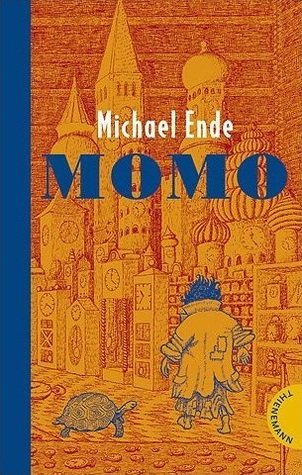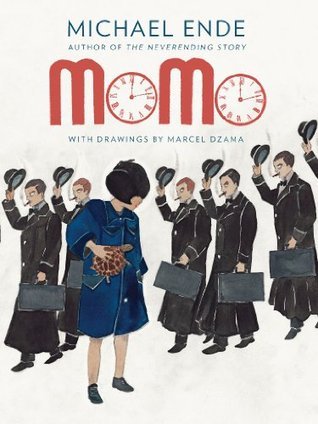
Are you always running out of time? Did you have to juggle a very hectic schedule today? Everyone's busy these days. Who isn't in this modern society? But if you've ever wondered where all your time has gone to, how it's possible to wake up one day and find yourself turning 30s, 40s or 50s when you still feel like 20 in your heart, how time can seem to fly faster than the speed of light, then there are two people I'd like you to meet: Momo and Beppo.
This book Momo aka The Men in Gray was written in 1973. It was originally written in German as a children's book. The author Michael Ende also wrote the more famous book "The Neverending Story". I personally believe that some children's books are actually meant for adults. They seem like totally different books when you read again after 10, 20 years and they resonate with you more than they did when you were young. I think this book is one of them. The full title in German of this book can be translated as "Momo, or the Strange Story of the Time-Thieves and the Child Who Brought the Stolen Time Back to the People" As explained in the German title, this book tells you about time in modern society, and how we should handle it in an enlightening and mind-touching way.

Source: Goodreads
Momo is a small and skinny girl. She has no home, no family. She can barely read. But there's something special about her: she listens to you. She doesn't just sit beside you, nodding her head half-heartedly or grunting "Yeah, right" every now and then. She listens with all her heart, as if you're the most important person in the world, as if what you're saying is the most interesting thing in the world. She's all ears.
She has many friends. Adults friends too, as well as children about her age. Since Momo listens to them, adults often go seek her out and tell her their problems. All Momo does is listen, but mysteriously and miraculously people can see things in perspective once they talk to Momo, and they feel like they can handle whatever problems they have.
One of Momo's best friends is Beppo, the street sweeper. He always tries to speak only the truth. How rare and precious a person he is in this society riddled with lies.
Beppo was widely believed to be not quite right in the head. This was because, when asked a question, he would give an amiable smile and say nothing. If, after pondering the question, he felt it needed no answer, he still said nothing. If it did, he would ponder what answer to give. He could take as long as a couple of hours to reply, or even a whole day. By this time the person who had asked the question would have forgotten what it was, so Beppo’s answer seemed peculiar in the extreme.
Only Momo was capable of waiting patiently enough to grasp his meaning. She knew that Beppo took as long as he did because he was determined never to say anything untrue. In his opinion, all the world’s misfortunes stemmed from the countless untruths, both deliberate and unintentional, which people told because of haste or carelessness. (p. 38)
People don't wait for answers. Sometimes people ask questions not because they genuinely want to know more about you, but because they can't stand the silence or they want to check what they're thinking about you is right or they want to judge and test you or simply because they want to talk about themselves but polite enough to ask about you first.
What would happen if we all think hard before talking, trying our best to say the truth? What the world would become?
We all should listen to what Beppo has to say about working.
He swept his allotted streets slowly but steadily, drawing a deep breath before every step and every stroke of the broom. Step, breathe, sweep, breathe, step, breathe, sweep…
...
“You see, Momo,” he told her one day, “it’s like this. Sometimes, when you’ve a very long street ahead of you, you think how terribly long it is and feel sure you’ll never get it swept.”
He gazed silently into space before continuing. “And then you start to hurry,” he went on. “You work faster and faster, and every time you look up there seems to be just as much left to sweep as before, and you try even harder, and you panic, and in the end you’re out of breath and have to stop – and still the street stretches away in front of you. That’s not the way to do it.”
He pondered a while. Then he said, “You must never think of the whole street at once, understand? You must only concentrate on the next step, the next breath, the next stroke of the broom, and the next, and the next. Nothing else.”
Again he paused for thought before adding, “That way you enjoy your work, which is important, because then you make a good job of it. And that’s how it ought to be.”
There was another long silence. At last he went on, “And all at once, before you know it, you find you’ve swept the whole street clean, bit by bit. What’s more, you aren’t out of breath.” He nodded to himself. “That’s important, too,” he concluded. (p. 39)
This got me thinking. How did I work today?
We all get anxious and fidgety when we think about our future. When can I land a solid job? When can I settle and start planning future? If we get nervous and restless, we tend to rush, become busier, and run out of breath, until we need to stop altogether. Sometimes we have to slow down in order to enjoy - and successfully finish - the job.
So, next time you find yourself hurrying too much, I hope you can remember Beppo - the street sweeper who knows how to breathe and sweep.
Step, breathe, sweep, breathe, step, breathe, sweep...

Source: Goodreads
Every now and then we all experience this: I want to live a wonderful life, but I don't have time to prepare for it.
“I’m an utter failure,” thought Mr. Figaro. “I mean, what do I amount to? A small-time barber, that’s all. If only I could lead the right kind of life, I’d be a different person altogether.”
…
“The trouble is,” he thought sourly, “my work leaves me no time for that sort of thing, and you need time for the right kind of life. You’ve got to be free, but I’m a lifelong prisoner of scissors, lather and chitchat.” (p. 60)
And the infamous Men in Gray started appearing in cities. They wore gray hats, gray suits, gray shoes. They held gray suitcases, drove gray cars, smoked gray cigars. And they urged people to save time so that they could secretly steal their time. One of the gray men even gave a piece of advice to Mr. Figaro how to save time.
“Surely you know how to save time, my dear sir? Work faster, for instance, and stick to essentials. Spend only fifteen minutes on each customer, instead of the usual half-hour, and avoid time-wasting conversations. Reduce the hour you spend with your mother by half. Better still, put her in a nice, cheap old folks’ home, where someone else can look after her – that’ll save you a whole hour a day. Get rid of that useless budgerigar. See Miss Daria once every two weeks, if at all. Give up your fifteen-minute review of the day’s events. Above all, don’t squander so much of your precious time on singing, reading and hobnobbing with your so-called friends.” (p. 68)
People have no memory of ever meeting the gray men, but they remember very well the new resolution that they must save time.
Meanwhile, he was becoming increasingly restless and irritable. The odd thing was that, no matter how much time he saved, he never had any to spare; in some mysterious way, it simply vanished. Imperceptibly at first, but then quite unmistakably, his days grew shorter and shorter. Almost before he knew it, another week had gone by, and another month, and another year, and another and another.
Having no recollection of the grey stranger’s visit, Mr. Figaro should seriously have asked himself where all his time was going, but that was a question never considered by him or any other timesaver. Something in the nature of a blind obsession had taken hold of him, and when he realized to his horror that his days were flying by faster and faster, as he occasionally did, it only reinforced his grim determination to save time.
...
Radio, television and newspapers daily advertised and extolled the merits of new, timesaving gadgets that would one day leave people free to live the ‘right’ kind of life. (p. 71)
Is it true? If we save enough time now, we can live happily ever after later?
The real picture, however, was very different. Admittedly, timesavers were better dressed than the people who lived near the old amphitheater. They earned more money and had more to spend, but they looked tired, disgruntled and sour, and there was an unfriendly light in their eyes. They’d never heard the phrase “Why not go and see Momo?” nor did they have anyone to listen to them in a way that would make them reasonable or conciliatory, let alone happy. Even had they known of such a person, they would have been highly unlikely to pay him or her a visit unless the whole affair could be dealt with in five minutes flat, or they would have considered it a waste of time. (p. 72)
People may agree on one thing: we shouldn't waste time. But what does "wasting time" mean? Taking a walk for an hour, playing with legos, reading books, shooting the breeze with friends, drinking beers alone at a bar, binge watching TV, spying on friends' Facebook albums, writing posts and replies and upvoting on other's postings in Steemit... Which is "wasting time" and which is not? Is there a definite standard? I bet everyone has a different opinion here.
As this book says, it seems that "The determination to save time now so as to be able to begin a new life sometime in the future had embedded itself in his soul like a poisoned arrow." We have to ponder why we save time and what we want to do with it. Because we can't become parrots always shouting "Busy, busy!", can we?
When you leave this post and return to your busy life, I hope you can remember Momo and Beppo, who know how to listen and breathe.
Title: Momo
Author: Michael Ende
Disclaimer) There's only first part of the storyline in this review to introduce the book. No major spoiler included.
Here are the recent 5 bookreviews that I wrote.
If you follow @bree1042, you can read many more interesting bookreviews!
#11. The Lovely Bones by Alice Sebold ㅡ To Become Family Again
#12. Trouble by Gary D. Schmidt - To Find Out How to Live with Trouble
#13. Sophie's Choice by William Styron - Craziness of War
#15. Native Speaker by Chang-rae Lee - Neither Korean Nor American

